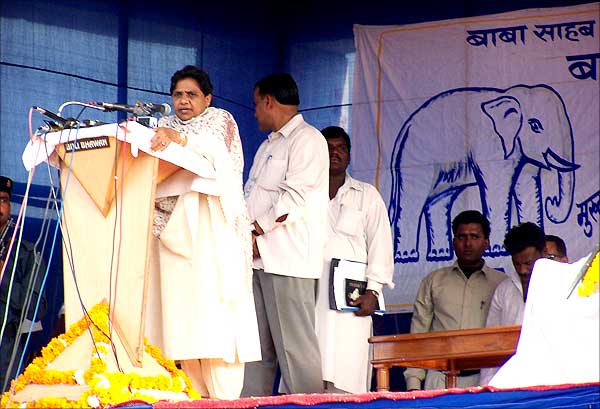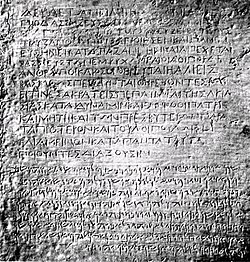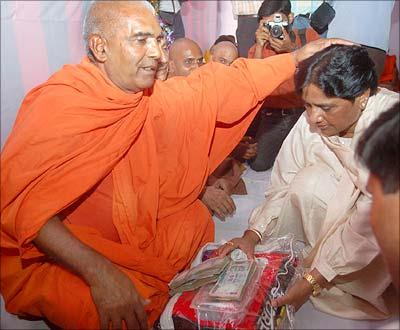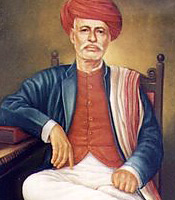“One who sees the Dhamma sees me. One who sees
me sees the Dhamma.” Buddha
Budh is Wisdom
Buddha
is a Title Like a President or Prime Minister of a Country-meaning- Any
One with an Exalted, Blessed, Noble and an Awakened Mighty Great Mind
with full Awareness
Dhamma is the Practice of His Teachings

Thou Shalt Not Cut this Tree!
There are five nikayas (collections) of suttas:
The Vinaya Pitaka, the first division of the Tipitaka,
is the textual framework upon which the monastic community (Sangha) is
built. It includes not only the rules governing the life of every
Theravada bhikkhu (monk) and bhikkhuni (nun), but also a
host of procedures and conventions of etiquette that support harmonious
relations, both among the monastics themselves, and between the
monastics and their lay supporters, upon whom they depend for all their
material needs.
When the Buddha first established the Sangha, the community
initially lived in harmony without any codified rules of conduct. As
the Sangha gradually grew in number and evolved into a more complex
society, occasions inevitably arose when a member would act in an
unskillful way. Whenever one of these cases was brought to the Buddha’s
attention, he would lay down a rule establishing a suitable punishment
for the offense, as a deterrent to future misconduct. The Buddha’s
standard reprimand was itself a powerful corrective:
It is not fit, foolish man, it is not becoming, it is not proper, it
is unworthy of a recluse, it is not lawful, it ought not to be done.
How could you, foolish man, having gone forth under this Dhamma and
Discipline which are well-taught, [commit such and such offense]?… It
is not, foolish man, for the benefit of un-believers, nor for the
increase in the number of believers, but, foolish man, it is to the
detriment of both unbelievers and believers, and it causes wavering in
some.
— The Book of the Discipline, Part I, by I.B. Horner (London: Pali Text Society, 1982), pp. 36-37.
The monastic tradition and the rules upon which it is built are
sometimes naïvely criticized — particularly here in the West — as
irrelevant to the “modern” practice of Buddhism. Some see the Vinaya as
a throwback to an archaic patriarchy, based on a hodge-podge of ancient
rules and customs — quaint cultural relics that only obscure the
essence of “true” Buddhist practice. This misguided view overlooks one
crucial fact: it is thanks to the unbroken lineage of monastics who
have consistently upheld and protected the rules of the Vinaya for
almost 2,600 years that we find ourselves today with the luxury of
receiving the priceless teachings of Dhamma. Were it not for the
Vinaya, and for those who continue to keep it alive to this day, there
would be no Buddhism.
It helps to keep in mind that the name the Buddha gave to the spiritual path he taught was “Dhamma-vinaya” — the Doctrine (Dhamma) and Discipline (Vinaya)
— suggesting an integrated body of wisdom and ethical training. The
Vinaya is thus an indispensable facet and foundation of all the
Buddha’s teachings, inseparable from the Dhamma, and worthy of study by
all followers — lay and ordained, alike. Lay practitioners will find in
the Vinaya Pitaka many valuable lessons concerning human nature,
guidance on how to establish and maintain a harmonious community or
organization, and many profound teachings of the Dhamma itself. But its
greatest value, perhaps, lies in its power to inspire the layperson to
consider the extraordinary possibilities presented by a life of true
renunciation, a life lived fully in tune with the Dhamma.
Contents ![[go up]](http://www.accesstoinsight.org/icon/scrollup.gif)
- I. Suttavibhanga — the basic rules of conduct (Patimokkha) for bhikkhus and bhikkhunis, along with the “origin story” for each one.
- II. Khandhaka
- A. Mahavagga
— in addition to rules of conduct and etiquette for the Sangha, this
section contains several important sutta-like texts, including an
account of the period immediately following the Buddha’s Awakening, his
first sermons to the group of five monks, and stories of how some of
his great disciples joined the Sangha and themselves attained Awakening. - B. Cullavagga
— an elaboration of the bhikkhus’ etiquette and duties, as well as the
rules and procedures for addressing offences that may be committed
within the Sangha.
- A. Mahavagga
- III. Parivara — A
recapitulation of the previous sections, with summaries of the rules
classified and re-classified in various ways for instructional purposes.
The Suttavibhanga contains the basic training rules for bhikkhus and
bhikkhunis, along with the “origin story” for each one. These rules are
summarized in the Patimokkha, and amount to 227 rules for the bhikkhus, 311 for the bhikkhunis. The Patimokkkha rules are grouped as follows:
- Parajika: rules entailing expulsion from the Sangha (Defeat) (4 for bhikkhus, 8 for bhikkhunis)
- Sanghadisesa: rules entailing an initial and subsequent meeting of the Sangha (13, 17)
- Aniyata (indefinite) rules (2, 0)
- Nissaggiya pacittiya: rules entailing forfeiture and confession (30, 30)
- Pacittiya: rules entailing confession (92, 166)
- Patidesaniya: rules entailing acknowledgement (4, 8)
- Sekhiya: rules of training (75, 75)
- Adhikarana samatha: rules for settling disputes (7, 7)
Summaries and anthologies based on the Suttavibhanga:
- The Bhikkhus’ Rules — A Guide for Laypeople: The Theravadin Buddhist Monk’s Rules Compiled and Explained, by Bhikkhu Ariyesako.
- The Bhikkhuni Patimokkha: The Bhikkhunis’ Code of Discipline, Thanissaro Bhikkhu, trans. A concise summary of the bhikkhuni Patimokkha rules.
- The Buddhist Monastic Code, Volume I: The Patimokkha Training Rules Translated and Explained, by Thanissaro Bhikkhu. This book provides an in-depth examination of each of the rules.
- Introduction to the Patimokkha Training Rules, by Thanissaro Bhikkhu
- The Patimokkha: The Bhikkhus’ Code of Discipline, Thanissaro Bhikkhu, trans. A concise summary of the bhikkhu Patimokkha rules.
With this background, we may now look at the content of the rules.
What follows is a list summarizing the basic meanings of the rules,
organized into five major categories: dealing with Right Speech, Right
Action, Right Livelihood, Communal harmony and the etiquette of a
contemplative. The first three categories — the factors of the Noble
Eightfold Path that make up the training in heightened virtue — are
especially useful for showing how the rules relate to the Buddhist path
as a whole.
These five categories are not sharply distinct types. Instead, they
are more like the colors in the band of light thrown off by a prism —
discernably different, but shading into one another with no sharp
dividing lines. Right Speech, for instance, often shades into Communal
harmony, just as Right Livelihood shades into personal etiquette. Thus
the placement of a particular rule in one category rather than another
has been a somewhat arbitrary process. There are a few cases — such as
Pācittiyas 46 & 84
— where the reason for placing the rule in a particular category will
become clear only after reading the detailed discussions in BMC.
Each rule is followed by a code giving the rule’s number in its section of the Patimokkha.
If you count the number of rules in the list, you will see that they
do not quite equal 227. This is because there are a couple of cases
where I have condensed two or three Sekhiya rules into one summary.
Right Speech ![[go up]](http://www.accesstoinsight.org/icon/scrollup.gif)
MN 117 defines wrong speech as lying, divisive speech, abusive speech, and idle chatter.
Lying ![[go up]](http://www.accesstoinsight.org/icon/scrollup.gif)
Making an unfounded charge to a bhikkhu that he has committed a
pārājika offense, in hopes of having him disrobed, is a saºghādisesa
offense. (Sg 8)
Distorting the evidence while accusing a bhikkhu of having committed
a pārājika offense, in hopes of having him disrobed, is a saºghādisesa
offense. (Sg 9)
The intentional effort to misrepresent the truth to another individual is a pācittiya offense. (Pc 1)
Making an unfounded charge to a bhikkhu — or getting someone else to
make the charge to him — that he is guilty of a saºghādisesa offense is
a pācittiya offense. (Pc 76)
Divisive speech ![[go up]](http://www.accesstoinsight.org/icon/scrollup.gif)
Telling a bhikkhu about insulting remarks made by another bhikkhu —
in hopes of winning favor or causing a rift — is a pācittiya offense. (Pc 3)
Abusive speech ![[go up]](http://www.accesstoinsight.org/icon/scrollup.gif)
An insult made with malicious intent to another bhikkhu is a pācittiya offense. (Pc 2)
Idle chatter ![[go up]](http://www.accesstoinsight.org/icon/scrollup.gif)
Visiting lay families — without having informed an available bhikkhu
— before or after a meal to which one has been invited is a pācittiya
offense except during the robe season or any time one is making a robe.
(Pc 46)
Entering a village, town, or city during the period after noon until
the following dawn, without having taken leave of an available bhikkhu
— unless there is an emergency — is a pācittiya offense. (Pc 85)

the Mauryan empire, bear Buddhist symbols such as the Dharmacakra,
the elephant (previous form of the Buddha), the tree under which
enlightenment happened, and the burial mound where the Buddha died
(obverse). 3rd century BC.
|
Mayawati: Original Inhabitant of Jambudvipa that is The Great Prabuddha Bharath ’queen’, now Brahmin messiah |
 |
|
Chhatrapati Shahu Maharaj
|
 |
April 141891 – December 6 1956
 |
 |
 |





Move for Third Front alive, says Gowda
P. Sunderarajan
| “No objection to projecting Mayawati ” |
NEW DELHI: The former Prime Minister and Janata Dal (Secular)
president, H.D. Deve Gowda, on Friday asserted that moves to form a
Third Front were very much alive and that the efforts would regain
momentum once the Assembly elections in Madhya Pradesh, Rajasthan,
Delhi and other States were over next month.
“It [the Third Front] is 100 per cent going to be a reality. It will
have a significant strengthen in the next Lok Sabha,” he said, in an
informal chat with reporters.
Asked about the move to project Uttar Pradesh Chief Minister and
Bahujan Samaj Party leader Mayawati as the prime ministerial candidate,
he recalled that his party had declared its support for her and said
there was no change in the stance.
Asked about the possibility of the JD (S) and the Congress coming
together for the by-elections to eight seats in the Karnataka Assembly,
he said his party was still open to the idea of an alliance. It was for
the Congress to make up its mind.
Seven of the Assembly seats fell vacant following the defection of
four JD (S) and three Congress MLAs to the Bharatiya Janata Party
(BJP), and one following the death of a JD (S) MLA
Charging the BJP with using money power freely in the recent local
body elections, Mr. Gowda said, “the unprecedented policy of the party
to be in power at any cost is causing immense harm to the social fabric
of the State.”
Asked about the resignation of five JD(U) members of Parliament from
the Lok Sabha over the attack on Biharis in Maharashtra, he said
party’s action was commendable, as it had kept its promise.
Press Information Bureau
(Chief Minister’s Information Campus)
Information & Public Relations Department, U.P.
UP Cabinet decides to waive off Rs. 120 crore loan distributed among 7.5 lakh poor people under various schemes of Anusuchit Jaati Vitta Evam Vikas Nigam
C.M. writes letter to Prime Minister to
waive off Central share as well as bank loan and interest
Lucknow : 07 November, 2008
The Uttar Pradesh Government has decided to waive off loans more
than 10 years old distributed under margin money scheme run by the UP
Anusuchi t Jaati Vi tta Evam Vikas Nigam under various sel f employment
schemes, which had become non-performing assets. According to the
decision, the principal amount provided by the State Government as i ts
share and interest would be waived off. A decision to this effect was
taken at a Cabinet meeting held here today. The Chief Minister Ms.
Mayawati has wri tten a letter to the Prime Minister in this regard and
requested the Prime Minister that the Central Government should also
waive off i ts loan share including interest, besides, the Centre should
also take steps to waive off bank loans provided to the beneficiaries and
interests as well , so that lakhs of poor people belonging to scheduled
castes could be freed from loans. She has requested to the Prime
Minister that the Rashtriya Anusuchi t Jaati Vi tta Evam Vikas Nigam
should take such step for other States as well so that the poor people
could be saved from the loans distributed under this scheme.
It may be recalled that since 1980-81 the UP Anusuchit Jaati Vi tta
Evam Vikas Nigam was providing 25 per cent margin money of the
project costs as loan to the poor and unemployed SC persons under
various schemes of economic development for sel f employment. These
schemes were being run wi th the cooperation of the banks. Owing to the
tough loan policy of the banks, necessary amount needed for the
economic development projects, run for the poor and unemployed SC
people, was not made available and because of i t most of the financed
uni ts became NPAs and the borrowers faced financial di fficulties.
2
Presently, a large number of people belonging to SCs were burdened
wi th these loans.
Keeping this in view, the State Government has decided to waive
off loans more than 10 years old and given to poor and unemployed
people by the UP Anusuchi t Jaati Vi tta Evam Vikas Nigam to a maximum
limit of Rs. 10,000. An amount of Rs. 235.84 crore is to be recovered
from 7,58,361 beneficiaries under the margin money loans more than 10
years old. Out of this amount, Rs. 169.08 crore is the principal amount
while Rs. 66.77 crore is the interest. The 51 per cent of the principal
amount of Rs. 169.08 crore Rs. 86.23 crore was State’s share which is
around 51 per cent, while Centre’s share stood at Rs. 82.85 crore which
is around 49 per cent. Likewise, out of the total interest amount of Rs.
66.77 crore, State’s share stood at Rs. 34.05 crore whi le Centre’s share
was Rs. 32.72 crore. The State Government has decided to provide
subsidy for i ts principal amount as well as interest which totals to Rs.
120.28 crore. Besides, Ms. Mayawati has requested Centre in her letter
that i ts share of Rs. 115.57 crore, which included principal amount of
Rs. 82.85 crore and interest of Rs. 32.72 crore should also be waived
off.
It may be recal led that UP Anusuchi t Jaati Vi tta Evam Vikas Nigam
provided 25 per cent of the project cost as margin money loan on 4 per
cent annual interest rate to people belonging to SC category under sel f
employment schemes. These schemes were being run wi th the
cooperation of the banks. Since the beneficiaries could not repay thei r
loans they were unable to get addi tional loans. It may be recal led that
most of the beneficiaries had borrowed smal l amounts, but were unable
to repay them and because of i t thei r financial condi tion had become
precarious.
Ms. Mayawati has requested the Prime Minister that the Centre
should also take this step for all the States as wel l and di rect the
Rashtriya Anusuchit Jaati Vi tta Evam Vikas Nigam and banks to waive
off thei r loan amounts and interest so that the beneficiaries could get
some rel ief and the debt-ridden poor people could be retrieved. She said
that the State Government had taken this step in the interest of poor
people belonging to SC category of the State.
*******
Six BSP candidates file papers for Rajya Sabha polls
Special Correspondent
Photo: Subir Roy

All smiles: Uttar Pradesh Chief Minister Mayawati
with the party candidates in Lucknow on Friday.
LUCKNOW: Six Bahujan Samaj Party candidates filed their nomination
papers for the Rajya Sabha elections from Uttar Pradesh on Friday. The
party leader, Chief Minister Mayawati, was present during the
nomination proceedings.
The nominations were submitted to the Returning Officer, Pradeep
Dubey, in the Central Hall of the State Assembly here. The elections
are due on November 21.
The BSP candidates are Vir Singh, Avtar Singh Karimpuri, Raja Ram,
Brij Lal Khabri (all Dalits), Akhilesh Das and Brijesh Pathak (Upper
Caste).
Mr. Vir Singh, who is an advocate by profession, has been
re-nominated. He is in charge of the Maharashtra unit of the BSP,
whereas Mr. Karimpuri, a Sikh, is the president of the Punjab unit of
the party.
A BSP member of the UP Legislative Council, Mr. Raja Ram is
currently in charge of the BSP’s Madhya Pradesh unit and has been given
the re-nomination.
Mr. Brij Lal Khabri is a former BSP Member of Parliament and is presently in charge of the BSP’s Jharkhand unit.
Of the two Upper Caste nominees, Dr. Das belongs to the Vaishya
community and is also the BSP candidate from Lucknow for the Lok Sabha
elections.
A Brahmin, Mr. Pathak is the sitting BSP MP from Unnao, and
following his nomination for the Rajya Sabha polls, will gave way to
another candidate from the Brahmin community to contest the Lok Sabha
election from Unnao.
Garden Fair of APD opens
Staff Reporter
There are 300 plant varieties that trainees were taught to grow as part of the programme
The fair also has stalls displaying horticultural books and equipment
Bangalore: Tucked away in a cosy part of Jeevanbimanagar is the
Horticultural Campus of The Association of People with Disability
(APD). It was brimming with people on Friday as it was their annual
Garden Fair.
The fair is the collective effort of 75 trainees and 40 staff of the
10-month residential horticultural programme of the APD. It features
over 300 varieties of plants that the trainees had been taught to grow
and nurture as part of the programme. Culinary and medicinal herbs,
potted flowers and tree plants were the favourites of close to 200
people who visited the fair in the first half of the day alone.
Jija Madhavan Harisingh, Director-General of Police, who inaugurated
the fair, said she was honoured to be associated with the APD. She
added that she would be happy to absorb the trainees of the APD into
the Fire and Emergency Services Department.
“Most of these trainees are from rural areas in the State, while
some come from outside the State as well,” said Ganesh Hegde, Senior
Programme Manager, Horticulture. He said that the focus of APD’s
horticulture programme was to make the trainees self-reliant. APD sees
great employment potential in Bangalore as far as gardening is
concerned, he said.
“In the one-month bridge course in the beginning of the programme,
they were taught the most basic things such as learning to take a bath
every day and cleaning,” said Rajni Wadhwani, volunteer at the APD. For
six months, the trainees were given theoretical training and the rest
of the four months were spent in practical learning in different parts
of the State, after which they are ready to seek employment. Only men
are part of the horticultural programme.
The Garden Fair is a result of the trainees’ learning and the
horticulture campus of the APD also features related stalls such as
composting, displays of horticultural books and equipment.
“The prices of the plants are fairly competitive,” said Ms.
Wadhwani. In its 12th year, the Garden Fair has become instrumental in
raising funds for APD, she said. Members of the APD also say that over
5,000 people are expected to visit the Garden Fair this year.
The fair is open to the public between 9 a.m. and 6 p.m. every day
till November 11. For further details contact the Horticultural Campus
of the APD at 25288672.
Staff Reporter

A GIFT OF LIFE: A person with disability takes care
of a sapling at the APD Horticultural Centre in Jeevan Bhimanagar in
Bangalore preparing for the Garden Fair.
Bangalore: “Garden Fair – 2008”, an event showcasing exotic culinary
herbs, medicinal plants, and over 300 varieties of flora cultivated by
the people with disabilities, will be organised by the Association of
People with Disability (APD) from November 7 to 14.
Senior IPS officer Jija Harisingh will inaugurate the event, which
will be held at the APD Horticultural Training Centre situated in the
LIC Colony, Jeevanbhimanagar.
“Garden Fair – 2008” has been organised to create awareness about
the neglected talent of the people with disability. The APD
Horticultural Training Centre, which was founded in 1987, grooms people
with speech, hearing and visual impairment, orthopaedic disabilities,
mild mental retardation and epilepsy.
They teach the disabled to grow plants, which serves as a
therapeutic activity that generates income through production and sale
of horticultural products. They attempt to make the physically disabled
self-reliant and give them an opportunity to integrate with society.
way.”
The Horticulture Centre offers a 10-month course on horticulture,
including six months of hands-on experience, aimed at providing
professional training to people with disabilities.
Pandyan Krishnan, an epileptic who has been at the nursery for over
three years, said, “I have learnt to remove weeds, re-pot plants, water
the plants and have found great happiness in being accepted by
society.” Balaji Singh, who is confined to a wheelchair, said: “I came
to this centre as a student and now I spend my time teaching others in
a similar condition as me. This nursery has added worth to my life
which was previously lacking.”
Washington: Barack Obama has launched his official
website, which invites users to share their ideas with the
President-elect. Asking citizens to share their vision for America, Mr.
Obama’s official website — www.change.gov
— went online enabling visitors to post, search and share details
related to his remarkable journey to the Oval Office. It states the
Obama-Biden combine’s plan of “increasing the number of legal
immigrants to keep families together and meet the demand for jobs that
employers cannot fill”. — PTI












